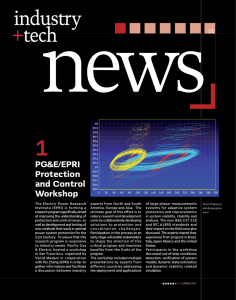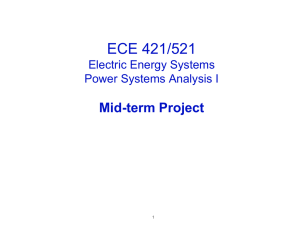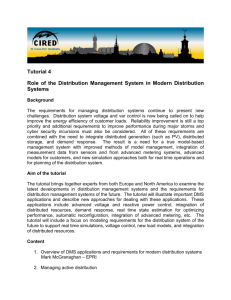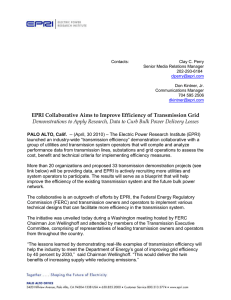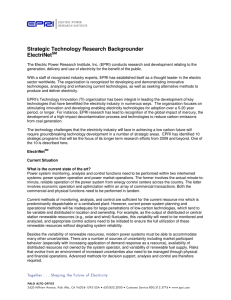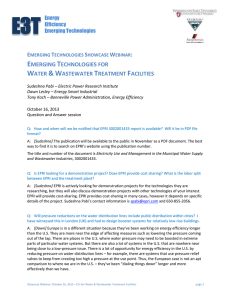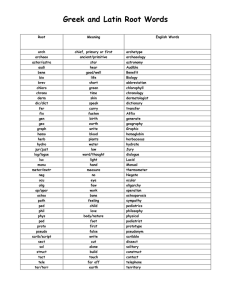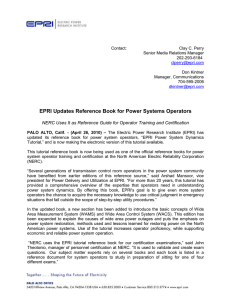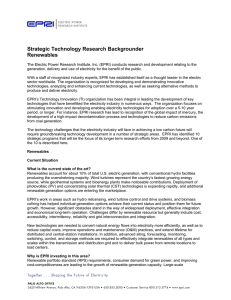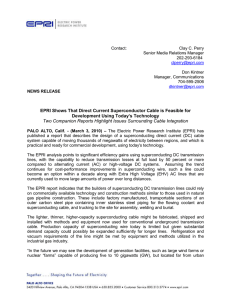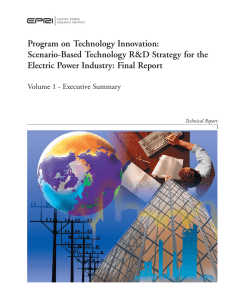Technology Innovation 10 Research Programs Backgrounder
advertisement
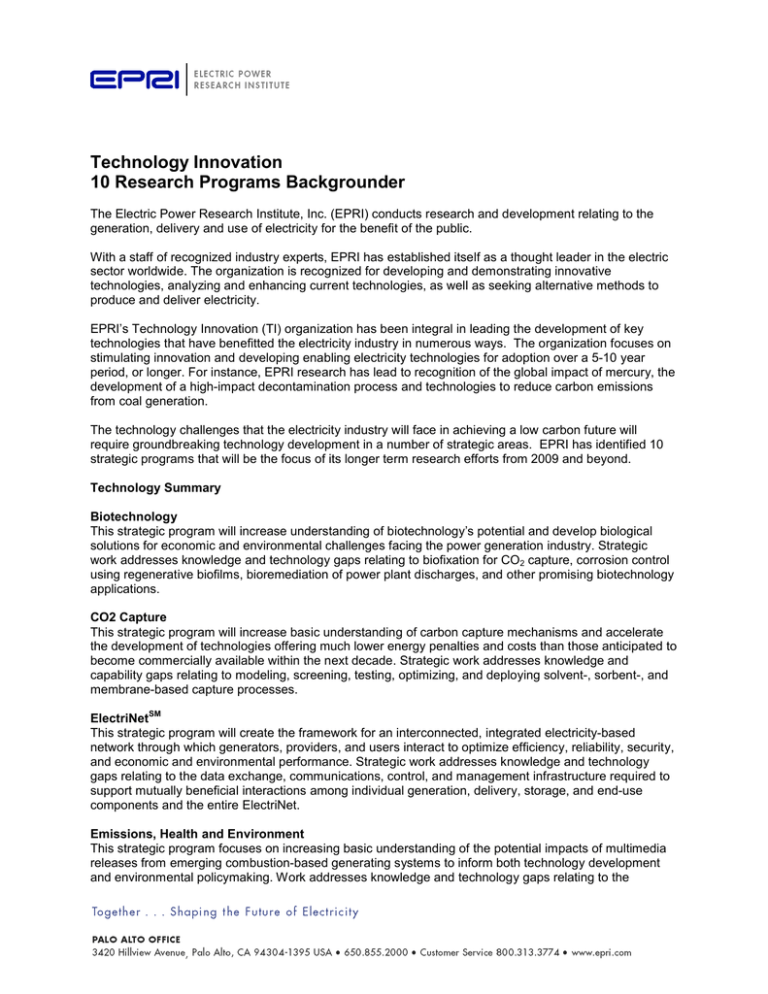
Technology Innovation 10 Research Programs Backgrounder The Electric Power Research Institute, Inc. (EPRI) conducts research and development relating to the generation, delivery and use of electricity for the benefit of the public. With a staff of recognized industry experts, EPRI has established itself as a thought leader in the electric sector worldwide. The organization is recognized for developing and demonstrating innovative technologies, analyzing and enhancing current technologies, as well as seeking alternative methods to produce and deliver electricity. EPRI’s Technology Innovation (TI) organization has been integral in leading the development of key technologies that have benefitted the electricity industry in numerous ways. The organization focuses on stimulating innovation and developing enabling electricity technologies for adoption over a 5-10 year period, or longer. For instance, EPRI research has lead to recognition of the global impact of mercury, the development of a high-impact decontamination process and technologies to reduce carbon emissions from coal generation. The technology challenges that the electricity industry will face in achieving a low carbon future will require groundbreaking technology development in a number of strategic areas. EPRI has identified 10 strategic programs that will be the focus of its longer term research efforts from 2009 and beyond. Technology Summary Biotechnology This strategic program will increase understanding of biotechnology’s potential and develop biological solutions for economic and environmental challenges facing the power generation industry. Strategic work addresses knowledge and technology gaps relating to biofixation for CO2 capture, corrosion control using regenerative biofilms, bioremediation of power plant discharges, and other promising biotechnology applications. CO2 Capture This strategic program will increase basic understanding of carbon capture mechanisms and accelerate the development of technologies offering much lower energy penalties and costs than those anticipated to become commercially available within the next decade. Strategic work addresses knowledge and capability gaps relating to modeling, screening, testing, optimizing, and deploying solvent-, sorbent-, and membrane-based capture processes. SM ElectriNet This strategic program will create the framework for an interconnected, integrated electricity-based network through which generators, providers, and users interact to optimize efficiency, reliability, security, and economic and environmental performance. Strategic work addresses knowledge and technology gaps relating to the data exchange, communications, control, and management infrastructure required to support mutually beneficial interactions among individual generation, delivery, storage, and end-use components and the entire ElectriNet. Emissions, Health and Environment This strategic program focuses on increasing basic understanding of the potential impacts of multimedia releases from emerging combustion-based generating systems to inform both technology development and environmental policymaking. Work addresses knowledge and technology gaps relating to the characteristics, environmental cycling, and ecological and human health risks of emissions from future fossil and biofuel plants incorporating CO2 capture and other advanced control systems. Near-Zero Emissions This strategic program will develop the advanced emissions control technologies required to maintain coal as a primary component of the electric sector’s fuel supply mix. Strategic work addresses knowledge and technology gaps relating to achievement of near-zero emissions of NOx, SO2, SO3, fine particulate matter, mercury, and other chemicals from conventional and advanced power plants fueled by coal and coal-biofuel blends. Materials – Delivery and End Use This strategic program will develop and apply nanotechnologies and other new materials to increase power transfer capability, enhance grid controllability and reliability, boost power delivery and end-use efficiency, and address climate change and other emerging issues. Strategic work addresses knowledge and capability gaps relating to cable dielectrics, power electronics materials and devices, transmissionclass insulators and structures, gaseous dielectrics, batteries, and building envelope components. Materials – Fossil and Nuclear Generation This strategic program will increase basic understanding of damage mechanisms and develop improved materials and coatings to support the continued operation of existing coal, natural gas, and nuclear capacity and the deployment of advanced plants. Strategic work addresses knowledge and technology gaps relating to materials behavior, damage initiation and propagation, condition assessment, and failure prevention in high-temperature environments. Nondestructive Evaluation (NDE) This strategic program will advance NDE capabilities to reduce the cost of applying state-of-the-art methods, to detect incipient problems, and to inspect components that cannot currently be examined at nuclear plants and other generating facilities. Strategic work addresses knowledge and technology gaps relating to widespread use of ultrasonic testing, early detection of stress corrosion cracking and other common problems, and inspection of structural concrete, buried piping and tanks, and cast stainless steel components Renewables This strategic program will develop the new technologies required to support widespread renewables deployment in central-station and distributed applications. Strategic work addresses knowledge and technology gaps related to improving the cost and performance of wind, solar, geothermal, biomass, hydro, wave, and tidal energy systems and facilitating their integration as reliable, economical, and clean generation options. Sensors and Operations This strategic program will develop integrated sensor systems to improve real-time monitoring and control capabilities and increase the availability, reliability, and security of the electricity infrastructure. Strategic work addresses knowledge and technology gaps relating to sensing elements, sensor deployment and operations, data processing and analysis, communications, alarm and visualization, and automated and human decision-making for high-priority power delivery and fossil and nuclear plant applications. About EPRI The Electric Power Research Institute, Inc. (EPRI, www.epri.com) conducts research and development relating to the generation, delivery and use of electricity for the benefit of the public. An independent, 2 nonprofit organization, EPRI brings together experts from academia and industry as well as its own scientists and engineers to help address challenges in electricity generation, delivery and use, including health, safety and the environment. EPRI's members represent more than 90 percent of the electricity generated and delivered in the United States, and international participation extends to 40 countries. EPRI's principal offices and laboratories are located in Palo Alto, Calif.; Charlotte, N.C.; Knoxville, Tenn.; and Lenox, Mass. ### Contact: Don Kintner EPRI Manager, Communications dkintner@epri.com 704-595-2006 3
